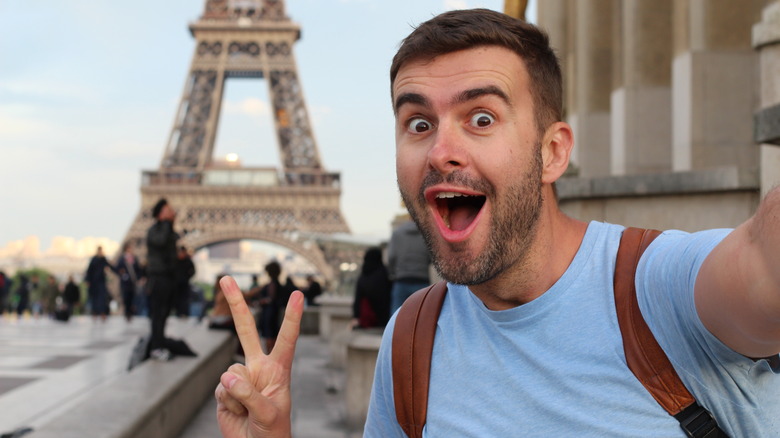In the U.S., it’s totally normal to give a “thumbs up,” in almost any environment. When something good happens, many Americans high-five. It’s perfectly fine to exclaim, “Awesome!” “Love it!” “Perfect!” or “Absolutely!” These expressions could relate to the most ordinary situations, like taking a certain highway exit or deciding to eat egg salad for lunch. Americans don’t always feel positive, but there’s a lot of pressure to look positive at all times, especially on vacation. This is the land of Disney World, after all, the “Happiest Place on Earth.” This is the culture that inscribed “the pursuit of happiness” into the Declaration of Independence and has sold the world half a billion copies of “Chicken Soup for the Soul” books. Americans are expected to be upbeat by default.
This attitude doesn’t translate well into French. When Americans show up in Paris or Nice — jabbering excitedly, snapping selfies, and pointing at every patisserie and glass of wine — French nationals often furrow their brows in confusion. They wonder: Why would anyone be so giddy? Is this all an act? Do Americans ever get tired? As Americans scurry from the Louvre to Notre Dame, commenting incessantly about how amazing everything is, the French think to themselves, “On se calme,” or “Let’s just calm it down.”
Or so travelers have observed. As Emily Monaco wrote in her perceptive essay for the BBC, “It’s not necessarily negativity that the French seek, but reserve… those who are unable to show the proper emotional detachment within French society can even be perceived as being somehow deranged.” This general reticence is akin to other divergent habits, like holding heated post-dinner debates, or the intimate French greeting known as “les bises,” that are woven into French culture yet may catch Americans off guard.
Balancing French and American temperaments
Like any cultural observation, this rule has many exceptions and shouldn’t be taken for granted. There are animated French citizens, and plenty of Americans are quiet and shy. Yet a demure affect is pretty common across northern Europe, from France to Germany to Scandinavia, and you won’t see many Europeans squealing with excitement or describing ordinary things as “super great.” On the website French à La Carte, a blog post insists foreign travelers should avoid flashy colors, sounding too familiar, showing extreme enthusiasm, or even smiling to excess. This makes the French sound stoic and grim, but it’s generally agreed that most French people just express enthusiasm in other, more internalized ways.
What does this mean for U.S. travelers? Should you pop a sedative, practice frowning, and bury your elation? Should you pretend this life-changing experience is actual a funeral, just to avoid making a scene? The short answer is no: You do you, because American habits are just as valid as anyone else’s, and if there’s one thing we should never be ashamed of, it’s expressing joy. France is full of wonders, and travel author Rick Steves even calls it the most exciting country in all of Europe. At the same time, the people you encounter may look amused or overwhelmed, and it wouldn’t hurt to tone down more disruptive expressions, like loud chatter, intense physicality, and running commentary about everything you see.
After a few days, most U.S. tourists will fall into France’s rhythm. The French are famous for long meals and effortless savoir-faire, which may appeal to chiller Americans. Your heart may leap at the sight of the Eiffel Tower, but you may also find yourself murmuring, “On se calme.”


